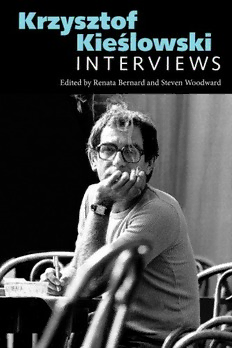
Krzysztof Kieślowski: interviews PDF
Preview Krzysztof Kieślowski: interviews
Krzysztof Kieślowski: Interviews Conversations with Filmmakers Series Gerald Peary, General Editor Krzysztof Kieślowski I n t e r v I e w s Edited by Renata Bernard and Steven Woodward University Press of Mississippi / Jackson www.upress.state.ms.us The University Press of Mississippi is a member of the Association of American University Presses. Copyright © 2016 by University Press of Mississippi All rights reserved Manufactured in the United States of America First printing 2016 ∞ Library of Congress Cataloging-in-Publication Data Kieslowski, Krzysztof, 1941–1996. Krzysztof Kieslowski : interviews / edited by Renata Bernard, Steven Woodward. pages cm. — (Conversations with filmmakers series) Includes bibliographical references and index. Includes filmography. ISBN 978-1-62846-213-5 (hardback) — ISBN 978-1-62674-574-2 (ebook) 1. Kieslowski, Krzysztof, 1941–1996—Interviews. 2. Motion picture producers and directors—Poland— Interviews. I. Bernard, Renata, editor. II. Woodward, Steven, 1964– editor. III. Title. PN1998.3.K54A3 2015 791.4302'33092—dc23 2015031995 British Library Cataloging-in-Publication Data available Contents Introduction ix Chronology xx Filmography xxxi The Dramaturgy of the Real 3 Krzysztof Kieślowski / 1968 16 or 35? 7 ski / 1970 A Film about the Working Class 9 pel / 1971 Interview Not for Print 12 Andrzej Kołodyński / 1973 Conversation with the Laureate 17 Zygmunt Kałużyński and Marian Turski / 1976 Interview with Krzysztof Kieślowski 25 Ginette Gervais / 1979 First Meetings with Krzysztof Kieślowski 28 Jacques Demeure / 1980 In Depth Rather than Breadth 36 Krzysztof Kieślowski / 1981 About Me, about You, about Everyone 41 Maria Marszałek / 1987 v vi contents Without Me 46 Bożena Janicka / 1988 On A Short Film about Killing 53 Hubert Niogret / 1988 The Key Thing Is to Make a Believable Film 62 Antoine Tixeront / 1988 Weapon of Despair 65 Stanisław Latek and Marie-Claude Loiselle / 1989 Interview with Krzysztof Kieślowski 69 Steve Goldman / 1989 A Normal Moment 72 Tadeusz Sobolewski / 1990 Diary: 1989–1990 (1) 83 Krzysztof Kieślowski / 1989–90 Diary: 1989–1990 (2) 88 Krzysztof Kieślowski / 1989–90 Diary: 1989–1990 (3) 92 Krzysztof Kieślowski / 1989–90 Express Meeting with Kieślowski 95 Stéphane Brisset / 1991 From Weronica to Véronique 97 Michel Ciment and Hubert Niogret / 1991 Tree That Is 106 Tadeusz Szczepański / 1991 Beautiful Slogans and Mystery 117 Hiroshi Takahashi / 1993 contents vii The Key to Sensitivity 122 Tadeusz Sobolewski / 1993 Behind the Curtain 126 Tadeusz Sobolewski / 1993 Blue Lollipop 130 Tadeusz Sobolewski / 1993 No End to the Enigma 135 Jonathan Romney / 1993 Glowing in the Dark 139 Tony Rayns / 1994 Kieślowski: The End 143 Katherine Monk / 1994 Colors of Life Interest Filmmaker 146 John Griffin / 1994 Auteur of His Own Destruction 149 Simon Hattenstone / 1994 Past, Present . . . Future? 153 Kristine McKenna / 1995 The Same Questions 159 Tadeusz Sobolewski / 1995 The Inner Life Is the Only Thing That Interests Me 164 Paul Coates / 1995 Fragments of the Meeting at the Ósmego Dnia Theatre 179 Marek Hendrykowski and Mikołaj Jazdon / 1996 Transcript of a Conversation for Polish Television 185 Grażyna Torbicka and Tadeusz Sobolewski / 1996 viii contents We Slip from God’s Hand 199 Agata Otrębska and Jacek Błach / 1996 Key Resources 213 Index 215 Introduction The story of Krzysztof Kieślowski, at least as it is known outside of Poland, is of a filmmaker rooted in the social documentary and politically engaged cinema of his homeland whose original tendencies, by force of personal, political, and economic changes, became grafted onto the wider cinematic tradition of Europe and the stylistics of the art cinema in the 1980s and 1990s. This book strives to give much greater nuance to that story, to represent Kieślowski’s hybrid career and oeuvre by mapping his own thoughts and feelings about his work, from 1968, when he was still in film school, to 1996, when the Three Colors trilogy had won him global critical acclaim and yet he had announced his retirement from filmmaking, at the relatively young age of fifty-two. In tracing this psycho-biographical narrative, our selection of interviews ranges across three different languages. Interviews with Kieślowski begin with Polish, expand to French in the late 1970s and 1980s, but only really appear in any number in English in the late 1980s and 1990s, after the international distribution of the Decalogue and the two related theatrical films. This development reflects Kieślowski’s expanding reputation beyond the borders of what was, until 1989, Eastern Bloc Poland. Kieślowski visited North America for the first time in October 1986, for the screening of No End at the New York Film Festival. (Camera Buff had been shown at the Chicago Film Festival in 1980 and Blind Chance in 1987.) However, only after 1991, when The Double Life of Véronique opened the New York Film Festival (and Miramax became involved in the distribution of his films), did U.S. publications take any prolonged interest in him. And even then, he was seldom properly interviewed. Instead, his comments at public screenings and film festivals filled out profiles of the man and reviews of his films. Even Kristine McKenna’s interview for the LA Times, reproduced here, is focused much more on the man and his beliefs than on the films themselves. This, in short, is one explanation for the rather unusual table of contents of this volume, oriented so heavily towards translations from Polish and French publications. But there is another reason, too. In seeking interviews for this book, we have carefully considered the merits of interviews in three different languages and their current accessibility. From that perspective, we believe that there is a considerable advantage to publishing translations of interviews that many ix
